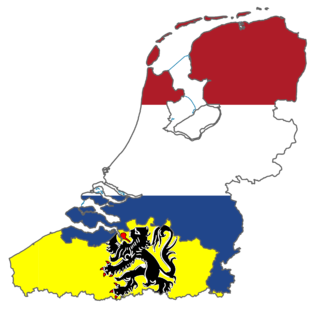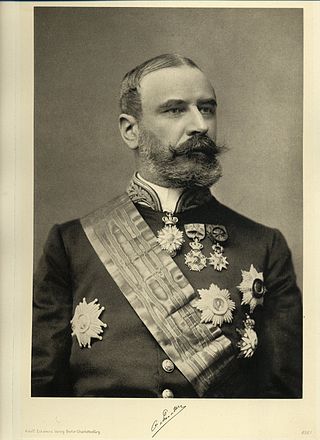
Aalst is a city and municipality on the Dender River, 31 kilometres (19 mi) northwest from Brussels in the Flemish province of East Flanders. The municipality comprises the city of Aalst itself and the villages of Baardegem, Erembodegem, Gijzegem, Herdersem, Hofstade, Meldert, Moorsel and Nieuwerkerken. Aalst is crossed by the Molenbeek-Ter Erpenbeek in Aalst and Hofstade. The current mayor of Aalst is Christoph D'Haese, from the New-Flemish Alliance party. The town has a long-standing (folkloric) feud with Dendermonde, which dates from the Middle Ages.

Christian Democratic and Flemish is a Flemish Christian-democratic political party in Belgium. The party has historical ties to both trade unionism (ACV) and trade associations (UNIZO) and the Farmer's League. Until 2001, the party was named the Christian People's Party.

People's Union was a Flemish nationalist political party in Belgium, formed in 1954 as a successor to the Christian Flemish People's Union.

The Rexist Party, or simply Rex, was a far-right Catholic, nationalist, authoritarian and corporatist political party active in Belgium from 1935 until 1945. The party was founded by a journalist, Léon Degrelle, and, unlike other fascist parties in the Belgium of the time, advocated Belgian unitarism and royalism. Initially the party ran in both Flanders and Wallonia, but it never achieved much success outside Wallonia and Brussels. Its name was derived from the Roman Catholic journal and publishing company Christus Rex.

The Flemish Movement is an umbrella term which encompasses various political groups in the Belgian region of Flanders and, less commonly, in French Flanders. Ideologically, it encompasses groups which have sought to promote Flemish culture and Dutch language as well as those who have sought greater political autonomy for Flanders within Belgium. It also encompasses nationalists who have sought the secession of Flanders from Belgium, either through outright independence or unification with the Netherlands.

Greater Netherlands is an irredentist concept which unites the Netherlands, Flanders, and sometimes including Brussels. Additionally, a Greater Netherlands state may include the annexation of the French Westhoek, Suriname, formerly Dutch-speaking areas of Germany and France, or even the ethnically Dutch and/or Afrikaans-speaking parts of South Africa, though such variants are mostly limited to far-right groups. A related proposal is the Pan-Netherlands concept, which includes Wallonia and potentially also Luxembourg.
The Party for Freedom and Progress was a liberal political party in Belgium which existed from 1961 until 1992. The party was the successor of the Liberal Party, which had roots dating back to 1846. It was succeeded in the Flemish Community of Belgium by the Flemish Liberals and Democrats (VLD) and in the French Community by the Liberal Reformist Party, Parti des Réformes et des Libertés de Wallonie and the current-day Reformist Movement. In the German-speaking Community, it still exists as the Party for Freedom and Progress.

Flemish political parties operate in the whole Flemish Community, which covers the unilingual Flemish Region and the bilingual Brussels-Capital Region. In the latter, they compete with French-speaking parties that all also operate in Wallonia. There are very few parties that operate on a national level in Belgium. Flanders generally tends to vote for right-wing, conservative parties, whereas in French-speaking Belgium the socialist party is usually the most successful one.

Adolf Daens was a Flemish priest from Aalst. Daens was a Jesuit from 1859 to 1871, but is especially known for his socio-political involvement after he joined the diocesan clergy. He created the Daensist movement from which the Christene Volkspartij party was created in 1893, after being inspired by Leo XIII's encyclical Rerum novarum. The Christene Volkspartij forced the radicalisation and democratisation of the Catholic party.

The Social Democratic Workers' Party was a Dutch socialist political party existing from 1894 to 1946, and a predecessor of the social democratic Labour Party.

Daens is a 1992 Belgian period drama film directed by Stijn Coninx, after a novel by Louis Paul Boon. This 1992 drama starring Jan Decleir, Gérard Desarthe, Antje de Boeck and Michael Pas, tells the true story of Adolf Daens, a Catholic priest in Aalst who strives to improve the miserable working conditions in the local factories. It was nominated for an Academy Award for Best Foreign Language Film in 1992.
This article gives an overview of socialism in the Netherlands, including communism and social democracy. It is limited to communist, socialist, social democratic, and democratic socialist parties with substantial support, mainly proved by having had a representation in parliament. The sign ⇒ means a reference to another party in that scheme.
The Catholic Party was a Belgian political party established in 1869 as the Confessional Catholic Party.

Charles, Count Woeste, was a Belgian Roman Catholic politician of German descent.

The Belgian Labour Party was the first major socialist party in Belgium. Founded in 1885, the party was officially disbanded in 1940 and superseded by the Belgian Socialist Party in 1945.

The Christian Social Party was a major centre-right political party in Belgium which existed from 1945 until 1968. Established as the successor to the pre-war Catholic Block, the new party was established with a "deconfessionalised" Christian Democrat orientation but split along linguistic lines in 1968 into the Christian Social Party and Christian People's Party. As the largest party throughout much of the period of its existence, it participated in most of the country's coalition governments during its existence alongside the Belgian Socialist Party and Liberal Party and provided a number of influential prime ministers.

The Charter of Quaregnon is a political manifesto agreed to in 1894 that formed the doctrinal basis for successive socialist parties in Belgium until 1979.
In the politics of Belgium, Unionism or Union of Opposites is a Belgian political movement that existed from the 1820s to 1846.

Partial legislative elections were held in Belgium on 22 May 1898, with run-off elections held on 29 May. Under the alternating system, elections for the Chamber of Representatives were held in only four out of the nine provinces: Hainaut, Limburg, Liège and East Flanders. Thus, only 75 seats out of the 152 seats in the Chamber of Representatives were up for election. The Catholic Party retained their absolute majority.
Lode Claes was a Belgian economist author, journalist and politician who was active within the Flemish nationalist movement.















